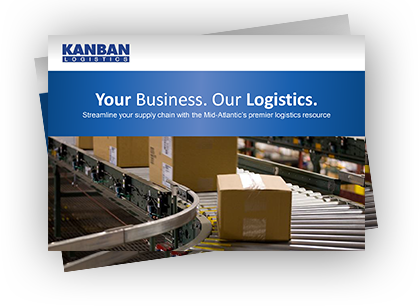As businesses prepare for the shifting trade policies and potential tariff changes anticipated under the incoming Trump administration, strategies to mitigate these uncertainties are more important than ever. One such strategy is leveraging a Foreign Trade Zone (FTZ) to gain cost and operational efficiencies. For businesses relying on international supply chains, partnering with a North Carolina-based 3PL like Kanban Logistics to navigate FTZ benefits can be a game-changer.
What Are Foreign Trade Zones?
Foreign Trade Zones, also known as “free-trade zones,” are secure areas located in or near U.S. ports that operate under the supervision of U.S. Customs and Border Protection (CBP). An FTZ can be a 3PL warehouse or a dedicated facility owned and operated by a manufacturer or distributor. These zones are considered outside CBP territory for duty purposes, enabling companies to defer, reduce, or even eliminate customs duties on imported goods.
Products entering an FTZ are not subject to duties or excise taxes until they leave the zone and formally enter U.S. commerce. If products are re-exported directly from the FTZ, no duties are owed at all. Additionally, FTZs offer flexibility for businesses to store, process, or assemble goods before determining their next steps—a significant advantage when navigating unpredictable tariff changes.
Foreign Trade Zone Benefits
FTZs offer several key benefits that can provide financial and operational stability:
- Duty Deferral and Reduction: Duties are deferred until goods leave the FTZ and enter U.S. commerce. If a finished product’s duty rate is lower than the rate for its individual components, companies pay the lower rate. No duties are owed if the goods are exported.
- Streamlined Customs Processes: FTZs allow for weekly summary filings, reducing paperwork and minimizing customs processing fees compared to individual shipment entries.
- Product Flexibility: Goods in an FTZ can be stored, cleaned, repaired, assembled, repackaged, or otherwise modified. This adaptability is particularly valuable when responding to changing market demands or tariff regulations.
- Enhanced Security: FTZs adhere to strict CBP security protocols, protecting inventory from theft or tampering.
- Unlimited Storage Time: Merchandise can remain in an FTZ indefinitely, providing businesses with the flexibility to store goods until they’re needed, or market conditions stabilize.
- Seamless Transfers: Products can move between FTZs without triggering duties, supporting regional supply chain strategies.
FTZs and Tariff Uncertainty
Tariff volatility can wreak havoc on supply chains, increasing costs and complicating inventory planning. FTZs provide a buffer against such uncertainty by allowing companies to defer duty payments until goods are sold or used domestically. This deferral not only delays cash outflows but also gives businesses the flexibility to adapt to new trade policies without immediately incurring additional costs.
For example, consider a company importing industrial components subject to fluctuating tariffs. By storing these components in an FTZ, the business can delay duty payments until the components are needed for manufacturing or sold domestically. If tariffs rise, the company has time to assess its options, such as sourcing alternatives or exporting the goods to avoid duties altogether.
The Role of 3PLs in FTZ Operations
While the benefits of FTZs are compelling, navigating their complexities can be daunting. Managing customs documentation, compliance requirements, and operational processes requires expertise that many businesses lack in-house. That’s where third-party logistics (3PL) providers come in.
A 3PL with FTZ experience, such as Kanban Logistics, can:
- Evaluate the feasibility of using an FTZ for your business.
- Handle the intricate paperwork and filings with CBP and other stakeholders.
- Manage the day-to-day operations of the FTZ, ensuring compliance and efficiency.
By outsourcing FTZ management to a 3PL, businesses can focus on their core operations while reaping the financial and operational benefits of an FTZ.
Kanban Logistics: FTZ Expertise in North Carolina
Kanban Logistics operates the only activated general-purpose FTZ in Eastern North Carolina. With 175,000 square feet of climate-controlled storage, rail siding, and a full-service transload yard, Kanban’s FTZ is a vital resource for businesses seeking to optimize their supply chains.
One notable success story involves an industrial belt manufacturer that imports raw materials from Taiwan through the Port of Norfolk. These materials were stored in Kanban’s FTZ until needed at nearby manufacturing plants, deferring duty payments and providing just-in-time inventory access. This arrangement has helped the company navigate both cost pressures and operational complexities.
Prepare for Tariff Uncertainty with Kanban Logistics
In uncertain times, businesses need reliable partners to help navigate change. Kanban Logistics’ expertise in FTZ operations ensures that your company can weather tariff fluctuations and maintain a competitive edge. Contact us today to learn how we can customize FTZ solutions to meet your needs.
Never Miss a Blog Post
Join our email list to receive new posts in your inbox. We will never spam you. Opt out anytime.
Blog Post Categories
- Outsourcing 3PL (72)
- Warehousing (72)
- North Carolina (52)
- east coast logistics (47)
- manufacturing logistics (26)
- Food Logistics (19)
- Fulfillment (18)
- CSX Carolina Connector (17)
- Miscellaneous (14)
- Free Trade Zone (FTZ) (12)
- FTZ / Free Trade Zones (11)
- Intermodal (11)
- Rail Siding (11)
- Port of Virginia (10)
- Cross Docking (7)
- Kitting (5)
- Aerospace (3)
- Pharmaceutical (3)
- Kanban News (2)
- QVC Rework Services (2)
- COO (1)
- container yard services (1)
- flexible (1)
- operations (1)
- scale (1)
- scott freeman (1)






